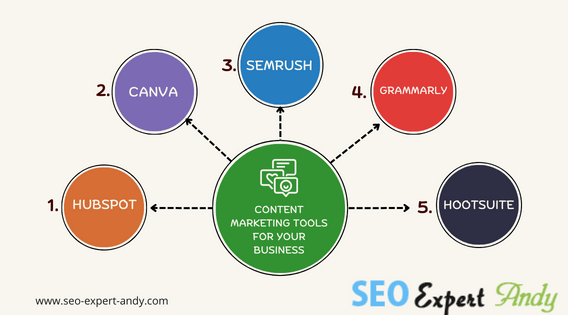Content marketing has become an essential strategy for businesses of all sizes. The aim of content marketing is to create valuable and informative content that will attract and engage an audience, build brand awareness, and ultimately drive profitable customer action. However, creating high-quality content is not enough; you need to promote it effectively to achieve your marketing goals.
Fortunately, there are many content marketing tools available that can help you create, distribute, and analyze your content to ensure that it is reaching your target audience and delivering results.
In this blog, we will explore some of the best content marketing tools businesses can use to create a successful content marketing strategy.
1: HubSpot
HubSpot is an all-in-one inbound marketing platform that provides tools for creating, managing, and promoting content. HubSpot’s content creation tools enable you to create blog posts, landing pages, and social media content, while its social media management tools help you schedule and publish posts across multiple social media platforms. HubSpot also provides analytics tools to measure the performance of your content and identify opportunities for improvement.
2: Canva
Canva is a graphic design tool that allows businesses to create professional-looking graphics for their content marketing campaigns. Canva’s drag-and-drop interface makes it easy to create designs for social media, blog posts, infographics, and other content formats. Canva also provides a library of templates and stock images to help you get started quickly.
3: SEMrush
SEMrush is an all-in-one digital marketing platform that provides tools for SEO, PPC, social media, and content marketing. SEMrush’s content marketing tools allow you to research keywords, analyze your competitors’ content, and track your content’s performance. SEMrush also provides tools for creating and managing your content calendar, and for identifying opportunities to promote your content to a wider audience.
4: Grammarly
Grammarly is an AI-powered writing assistant that helps businesses improve the quality and clarity of their written content. Grammarly’s browser extension and desktop app analyze your writing in real-time, providing suggestions for grammar, spelling, and clarity. Grammarly also provides tools for checking your content for plagiarism, ensuring that your content is original and high-quality.
5: Hootsuite
Hootsuite is a social media management platform that enables businesses to manage and schedule their social media content from a single dashboard. With Hootsuite, you can schedule posts across multiple social media platforms, monitor social media conversations, and analyze your social media performance. Hootsuite also provides tools for collaborating with your team on social media content creation and management.
6: Buzzsumo
Buzzsumo is a content research tool that enables businesses to discover the most popular content in their industry. With Buzzsumo, you can enter a keyword or topic and see the most shared content on social media, as well as the influencers who are sharing it. This information can help you identify trends, create better content, and reach a wider audience.
Content marketing is a powerful strategy for businesses looking to build brand awareness and drive profitable customer action. However, to be successful in content marketing, you need to use the right tools to create, distribute, and analyze your content effectively. By using tools like HubSpot, Canva, SEMrush, Buzzsumo, Grammarly, and Hootsuite, businesses can create high-quality content, reach a wider audience, and achieve their content marketing goals.
The Future of content marketing
The future of content marketing is an exciting topic, as the landscape is constantly evolving. Here are a few trends that are likely to shape the future of content marketing:
- Increased use of video: Video has already become a popular content format, and this trend is likely to continue. According to Cisco, video is expected to make up 82% of internet traffic by 2022. Brands are already investing in video content to engage their audiences, and this is likely to increase in the future.
- More personalized content: Consumers are increasingly expecting personalized content, and this trend is likely to continue. Brands are using data to create tailored content that resonates with their audiences, and this is likely to become more sophisticated in the future.
- Use of AI and machine learning: Artificial intelligence and machine learning are already being used in content marketing, and this trend is likely to continue. Brands use AI to automate content creation, personalize content, and analyze data to improve their content marketing strategies.
- Focus on user-generated content: User-generated content is becoming more popular as consumers are becoming more willing to share their experiences and opinions online. Brands use user-generated content to build trust with their audiences and create authentic content that resonates with them.
- Integration of content with other marketing channels: Content marketing is likely to become more integrated with other marketing channels, such as social media, email marketing, and SEO. Brands are already using content to drive engagement on these channels, and this trend is likely to continue as brands look to create more cohesive marketing strategies.
Also, Read
Build a career in content writing – 5 tips
In conclusion, the future of content marketing is likely to be shaped by video, personalized content, AI and machine learning, user-generated content, and integration with other marketing channels. Brands that stay on top of these trends and continue to innovate in their content marketing strategies are likely to see success in the future.
